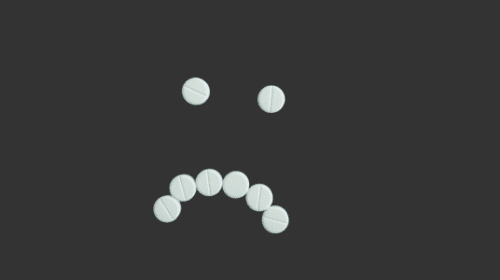Adderall is a prescription stimulant that helps people with ADHD stay focused and people with narcolepsy to stay awake. Millions of prescriptions are written for Adderall each year, and the number keeps growing.
Some people without ADHD or narcolepsy take Adderall because they mistakenly think they could experience the same boost in cognitive enhancement, although the evidence to support this is limited. This has unintended effects and, over the long term, could exacerbate certain health problems like increased risks of hypertension and a heart attack.
What is Adderall?
Adderall is a Schedule II amphetamine-derivative medication prescribed to manage the symptomatology of ADHD and narcolepsy. There are limited approved medical uses, and you need a prescription to possess any amount legally.
Adderall increases dopamine and norepinephrine in the brain, which helps in improving focus and reducing impulsivity in individuals with an appropriate diagnosis such as ADHD. Because it regulates dopamine levels, it has a potential for chemical dependency. It comes in immediate-release (IR) and extended-release (ER) versions.
Users with a history of cardiac abnormalities or serious heart conditions should avoid taking Adderall because it is documented to cause sudden death in such populations.[1] In 2021, there were 41.2 million prescriptions for Adderall or its generic equivalents.[2]
What Is Adderall’s Mechanism of Action?
Adderall stimulates the production of hormones dopamine and norepinephrine in the synaptic space between neurons.[3] People with an ADHD diagnosis often have trouble regulating a consistent amount of dopamine in their brains.[4]
This causes mood swings, volatility, stress sensitivity, and impulsivity. Adderall prevents dopamine from spilling and being absorbed into other parts of the brain.[5][6]
As an approved treatment for narcolepsy, Adderall helps stimulate norepinephrine, a hormone your body secretes during a stressful event that increases your wakefulness.[7] People with narcolepsy are usually missing the brain chemical hypocretin (also known as orexin), that regulates wakefulness.[8]
How Long Does Adderall Last?
The immediate-release version of Adderall lasts 4 to 6 hours, while the extended-release version lasts 8 to 12 hours.[9] Peak plasma concentration will be achieved in 3 hours for the IR formulation and 7 hours for the ER formulation.
The half-life of a given substance is the time it takes for 50% of that substance to get eliminated from the body. It takes 4 to 5 elimination half-lives to eliminate at least 95% of a substance from your body, at which point it is considered not statistically significant.
The half-life of Adderall is 9 hours for children (6-12yo), 11 hours for adolescents (13-17 yo), and 13 hours for adults (17+yo). That means Adderall will be statistically eliminated in 36-45 hours for kids, 44-55 hours for adolescents, and 52 to 65 hours for adults.[10] However, Adderall’s detection windows vary in reality in different parts of the body.
How Do People Misuse Adderall?

Sometimes, people without a proper diagnosis misuse Adderall for its supposed cognition improvements. This happens frequently in college settings with students who believe Adderall gives them a cognitive edge for coursework.
When people with a functioning dopamine transporter and plenty of chemicals in their brains to regulate wakefulness take Adderall, they may experience a surge in dopamine and norepinephrine levels, which leads to euphoria and wakefulness.
Chronic misuse of Adderall can potentially alter neurotransmitter signaling, including dopamine pathways, and could contribute to negative neuroadaptations, such as reduced sensitivity to natural rewards. When not taking Adderall, their brain could paradoxically associate its absence with feelings of anxiety and restlessness.[11]
What Are The Short-Term Effects Of Adderall?
Adderall is approved to help people with an official ADHD diagnosis maintain focus and reduce impulsivity. It is also used off-label to enhance the wakefulness of those with narcolepsy. Other than the intended effects, Adderall does have some other common short-term effects:[12]
- High blood pressure
- Headache
- Sleeplessness
- Appetite loss
- Dry mouth
- Weight loss
- Chest pain
- Nausea
- Diarrhea
- Mood swings
- Generalized anxiety
What Are The Long-Term Effects Of Adderall?
Adderall’s long-term effects are poorly understood, and more research is needed on the effects of long-term stimulant treatment for those with an ADHD diagnosis.[13] Since it regulates dopamine, there is a distinct chance that long-term Adderall usage could develop into an addiction if the usage happens outside of the context of an ADHD or narcolepsy diagnosis.
While not always long-term, there are serious adverse side effects that have been reported with Adderall, such as[14]
- Heart problems
- Heart attack
- Reduced blood flow to the limbs
- Raynaud disease
- Restricted blood flow to the brain
- Seizures
- Stevens-Johnson syndrome
- Life-threatening skin disorder
- Hypersensitive allergies
- Psychosis
Adderall Addiction Treatment
You can form both psychological and physical dependence on Adderall. If you’re taking more Adderall than is prescribed or tried to stop without success, reach out and ask for help today.
Addiction is a complex condition, and willpower alone is often insufficient to overcome it. The best way to overcome an Adderall addiction is to seek comprehensive treatment at an accredited addiction rehab center. With evidence-based pharmacological and behavioral interventions, you can safely pursue recovery.
Recovery Unplugged offers compassionate and accessible care to meet your whole-person needs as you navigate a challenging time. Staffed by world-class doctors, therapists, and creative professionals who aim to inspire you, we all believe in your capacity for recovery and healing.
We use music therapy as a foundation for all we do, supported by many other evidence-based therapies we are so proud to offer. We have a network of treatment centers in Texas, Florida, Tennessee, and Virginia. Even though each has its own musical culture, they all have the same level of care.
Contact admissions today to see how we can help you successfully navigate recovery.
Let’s Do This Together
The most effective recovery happens in a supportive community. Wherever you are, find a supportive community to give you emotional support and practical advice during the difficult days of recovery. Our treatment center professionals want nothing more than to join you in your recovery journey, giving you every tool and opportunity to succeed.

























